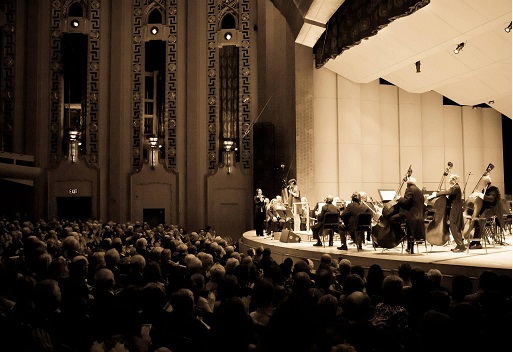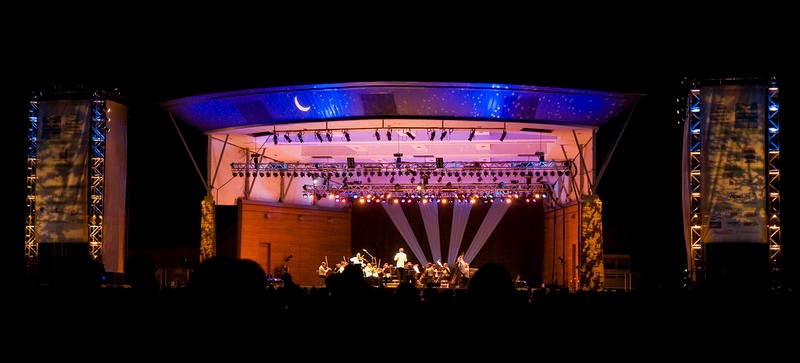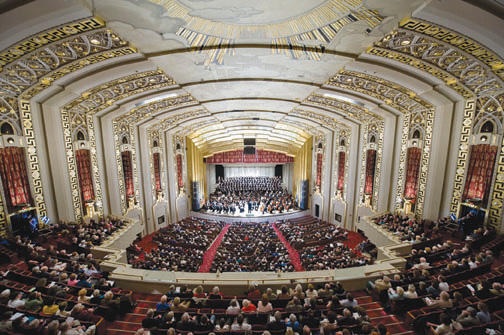Saving the Hartford Symphony
As you may have noticed, tensions between the management and the musicians of the Hartford Symphony Orchestra have been heating up as the two sides try to agree on a new contract.
Management, which basically now means the Bushnell [Center for the Performing Arts] under an administrative arrangement put in place a little more than a year ago, has proposed deep cuts in the number of guaranteed services – and by extension, the pay – offered to the players. Needless to say, the musicians, who are part-time but understandably dependent on their HSO income, are resisting these cuts.
I don’t think it’s ever a good idea to offer third-party opinions during an ongoing labor negotiation, and I will not do it here.
I will only say that I don’t perceive the situation to be hopeless, despite some sobering talk from both sides.
But I do want to say a couple of words about the rhetoric that has been floating around as general background noise to these negotiations.
Mainly I am thinking of the growing assertion that if the HSO is to survive and flourish, it must find more non-traditional (i.e., pop, or rock, or some variation thereof) kinds of work.
“We need to become more market-driven, more market-oriented,” CEO David Fay has been quoted as saying in several of the recent news accounts. And also: “We can’t be so precious about the music.”
Fay is not the only person down there talking this way. I hear this general line of thought from other management folk, and from some board members as well. The essence of the message is the same: “We have to approach the situation like a business, and find businesslike solutions.”
At first blush, this idea has a compelling, almost irresistible ring to it. I mean, who can argue with the notion of trying to give the audience what it says it wants? Isn’t this what any successful business does?
Arts groups are designated as nonprofits – with the tax advantages that such a designation confers – for basically one reason: Society, recognizing the arts as a valuable but fiscally fragile public resource, has decided they should be given some protection.
Armed with that protection, the arts groups are expected not simply to pander to public taste, but to help shape it.
That last part is what I don’t particularly hear in the current HSO administrative game plan.
The pesky underlying issue here is that a great professional orchestra exists to play the great orchestral repertoire – both modern and vintage – at the highest possible artistic level. Yes, of course, pops concerts can be fun, and can furnish a nice little ancillary zone of activity and outreach. And sure, maybe there is an additional stream of revenue to be had from backing up, you know, aging rock groups or video-game soundtrack nights or occasionally accompanying faux-classical figures like a Josh Groban or an Andrea Bocelli.
But, to take just one of several potential disconnects, if orchestras like the HSO stray too far from their traditional role and identity, there will literally be no musicians of any stature willing to play in them.
I’m afraid that the market-driven concept tends to completely miss this central point: the players sitting up there (even the younger ones who may actually like Josh Groban) didn’t work hard to get into distinguished conservatories and grad schools, didn’t spend long hours in tiny practice rooms, didn’t take out loans to buy first-class instruments, didn’t knowingly forsake a comfortable nine-to-five life – didn’t do all of this just to sit up on a stage and play whole notes behind some Fleetwood Mac tribute band.
I don’t want to sound like either a snob or a schoolmarm, but at a moment like this I think we need to say a kind of quaintly old-fashioned thing:
A professional symphony orchestra that isn’t primarily playing Brahms and Mahler and Britten and Strauss and Ravel and Stravinsky and Beethoven and Sibelius (and, of course, Adams and Ades and Higdon) is an orchestra that no longer has any real reason for being. And it certainly has no reason to expect, nor would it merit, support from either philanthropists or the IRS.
This is not some ivory tower philosophical position – it’s an entirely practical, fact-based statement. The sorry truth is that most of the pop/rock/commercial kinds of concerts we’re talking about could be easily handled by an informal pick-up roster of medium-level freelancers. There would be absolutely no need to go through the arduous (and, let’s admit, more expensive) task of recruiting and maintaining a regular ensemble of gifted, committed players. That is, an orchestra.
Is this to say that innovation and fresh thinking are unwelcome in the classical orchestral world?
On the contrary.
I for one am convinced that classical concerts need to absolutely be more approachable, more flexible, more inviting to the uninitiated (and for that matter, the initiated).
Asking the musicians to speak from the stage feels to me like a minimum requirement, at least for most concerts. I am also happy to entertain variations in concert dress, decorum, lighting, duration and almost everything else. You say you have new ideas on how to make the core music experience more vital and more meaningful? Bring them on.
While we’re at it, I can also imagine technology being a central part of the new order – from hi-def screens to holographic effects to real-time streaming to whatever else that’s out there or around the corner.
(Speaking of things around the corner, the Bushnell – even as we speak – is quietly trying to assemble an ambitious digital “institute” that would equip the hall, and therefore its users, with state of the art technology for doing these very things and more. I’m a little startled by the price tag for this project – reported to be in the several millions of dollars – but I would be foolish to comment on, much less stand in opposition to, a bold, big-picture initiative like this without knowing a whole lot more about it. I hope that in the coming days the Bushnell will see fit to share the details with everybody.)
One final word about running the orchestra like a business, and of the need to listen to the “customers.”
I basically agree with the customer part. In the arts, however, the customer relationship is more complicated than it is at Nordstrom’s or The Gap. An orchestra – like any theater company or museum – has to be prepared to sometimes stretch its ticket buyers, to challenge them, to take them to places they didn’t even know existed, and to which they certainly never would have been able to declare they “wanted” to go.
Finding the exact right balance between the familiar and the unfamiliar, or as the case may be the “serious” and the “popular,” is, as everyone in the business knows, tricky and probably getting trickier. But the calibration is essential and is itself now an intrinsic component of the artform – a delicate blend of instinct and courage and, above all, careful local audience cultivation and trust-building. It is not the province of focus groups or computer-generated surveys. Those things are OK, but when all is said and done, if conventional market-based data points are all that are driving the artistic decisions, the day is already lost.
Importantly, I find that most donors intuitively understand this. In my experience, major donors to arts groups wish, above all, to make a difference – to feel that their freely-given treasure is helping to advance something edifying and ennobling in their community.
Their instincts are correct: art is edifying and ennobling.
It can also be difficult, complex, costly. And sometimes it not only fails to conform to the marketplace, it – beautifully and defiantly — flies directly in the face of it.
The point is not that pops concerts are contemptible or that a certain amount of commercial-based gigging is going to be fatally corrupting. The point is that the HSO, if it’s going to remain an important and meaningful institution in our community, and worthy of attracting the kind of underwriting that it must attract, has to be, at least most of the time, doing important and meaningful things.
As the contract negotiations move along, I wish the process well, as I know we all do.
And I hope that the management team and the members of the board will keep in their sights not just the question of how to save our symphony, but why.
This article was originally published on July 9, 2015, on Hartford’s NPR affiliate’s website, wnpr.org, and is reprinted with the permission of the author.
Steve Metcalf was The Hartford Courant‘s fulltime classical music critic and reporter for over 20 years, beginning in 1982. He is currently the curator of the Richard P. Garmany Chamber Music Series at The Hartt School. He can be reached at spmetcalf55@gmail.com.




Leave a Comment: